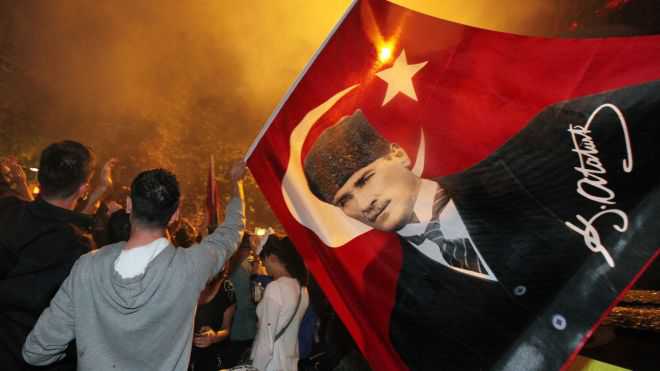Turkey: On Murder Anniversary, Doubts Remain Over Christians’ Safety
April 18, 2013 – 4:49pm, by Alexander Christie-Miller Turkey EurasiaNet’s Weekly Digest religious freedom Turkish Politics
On April 18 each year, a small group gathers at a cemetery in the city of Malatya in eastern Turkey to sing hymns and recite prayers at the grave of German missionary Tillman Geske.
They are marking the anniversary of Geske’s murder, along with two Turkish converts, at a Christian publishing house here in 2007. The service is the only time when Malatya’s tiny Christian community, flanked by police and a pack of journalists, gathers publicly.
But now, six years after the murders, which were among a spate of similar killings, Turkey’s leaders assert that the country is safe for long-persecuted religious groups.
Speaking in Moscow last month, Culture Minister Ömer Çelik invited Jews and Christians to return. “Turkey is no longer the same country,” he told reporters. “It has become a democratic country which protects its cultural heritage and embraces all ethnicities.”
That claim is being put to the test in Malatya with the trial of five local youths, who confessed to strangling and stabbing to death 45-year-old Geske, and publishing-house workers Necati Aydın, 36, and Uğur Yüksel, 32.
Prosecutors claim the killings were instigated by Turkey’s so-called “Deep State” – an alleged secret network of government, security, and army officials suspected in extra-judicial killings of minorities stretching back decades.
Under Turkey’s Islamist Justice and Development Party (AKP), the Deep State has become a recurring theme in various investigations and trials.
The lingering fears of this supposed network were heightened last month when one defendant, accused of helping plan the Malatya murders, made a death threat against Erdal Doğan, a lawyer representing the victims.
“If I were the Deep State, I would put a bullet in his head,” the defendant, Varol Bülent Aral, said of Doğan in court on March 8.
Doğan says the Malatya killings were an attempt by staunchly secular elements within the security forces to undermine the AKP government by attributing the crime to religious youths. He claims that the threat against him reflects that the case is laying bare the structure of the Deep State. “They are getting more and more uncomfortable with the direction of the trial and they want someone to take action,” he said of the alleged secret network. “As the trial goes deeper, they get more nervous.”
The testimony of İlker Çınar, a witness and suspect who says he worked for a secret body called the National Strategies and Operations Department of Turkey (TUSHAD), drives that view. Doğan claims that TUSHAD acted as a co-ordinating hub for different branches of Turkey’s security apparatus in targeting perceived domestic enemies.
At the trial, Çınar testified that TUSHAD ordered him to infiltrate the Christian missionary community between 1993 and 2005, when he was told to convert back to Islam and spread damaging gossip about the group.
In January this year, files containing detailed information about the Malatya victims were found by police at the house of another suspect, leading to the arrest of retired General Hürşit Tolon, the alleged founder of TUSHAD and ringleader of the supposed murder conspiracy.
Tolon denies any role in the killings, as well as the existence of TUSHAD, and claims the evidence against him is fabricated. İlkay Sezer, a lawyer representing Tolon, said: “Our client doesn’t know anybody who is being tried in this trial, he is in no way in contact with anyone. Also the suspects in the trial have stated that they do not know our client and haven’t been in contact with him.”
Doğan asserts that TUSHAD acted as the “black box” for a variety of crimes, and is linked to other murders involving religious disputes or minorities, including that of Catholic priest Andrea Santoro and Judge Mustafa Yücel Özbilgin in 2006, and Turkish-Armenian journalist Hrant Dink in 2007.
While Doğan believes the Deep State has lost its influence, he questions the government’s claim that Turkey’s minorities are now secure.
In Malatya, the authorities also are taking no chances. Both Tillman Geske’s widow, Susanne, who still lives in the city, and lawyers representing the victims can call in a police security detail whenever needed.
It also has taken steps to come to terms with the past. Once home to a large Armenian Christian community, the city last year began restoring a ruined Armenian church in the neighborhood where slain editor Dink grew up. It also announced that the street on which he was born would be renamed in his honor.
Yet, as the murder trial drags on, members of local minority communities do not feel a strong sense of security.
“Malatya is very silent now, but it could easily become chaotic,” commented Songül Canpolat, head of the city’s Pir Sultan Abdal Association, a body representing Alevis, a minority Islamic sect. “There are Kurds, Turks, Sunnis, Alevis, but everyone lives separately.”
Despite any such divisions, Susanne Geske is optimistic. Six years after her husband’s death, locals still approach her in the street to offer condolences. Last year, she applied for Turkish citizenship.
“We’re now at the stage where we’re thinking of opening a place where we can worship,“ she said of Malatya’s Christians. “Of going into the open again.”
Editor’s note: Alexander Christie-Miller is a freelance reporter based in Istanbul.
via Turkey: On Murder Anniversary, Doubts Remain Over Christians’ Safety | EurasiaNet.org.
